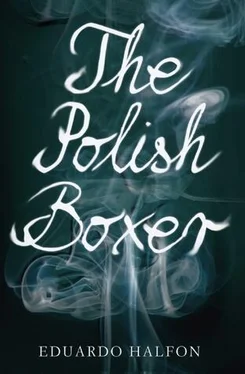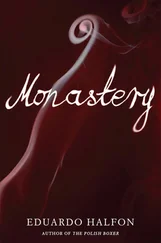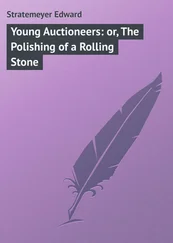Eduardo Halfon - The Polish Boxer
Здесь есть возможность читать онлайн «Eduardo Halfon - The Polish Boxer» весь текст электронной книги совершенно бесплатно (целиком полную версию без сокращений). В некоторых случаях можно слушать аудио, скачать через торрент в формате fb2 и присутствует краткое содержание. Год выпуска: 2012, Издательство: Bellevue Literary Press, Жанр: Современная проза, на английском языке. Описание произведения, (предисловие) а так же отзывы посетителей доступны на портале библиотеки ЛибКат.
- Название:The Polish Boxer
- Автор:
- Издательство:Bellevue Literary Press
- Жанр:
- Год:2012
- ISBN:нет данных
- Рейтинг книги:4 / 5. Голосов: 1
-
Избранное:Добавить в избранное
- Отзывы:
-
Ваша оценка:
- 80
- 1
- 2
- 3
- 4
- 5
The Polish Boxer: краткое содержание, описание и аннотация
Предлагаем к чтению аннотацию, описание, краткое содержание или предисловие (зависит от того, что написал сам автор книги «The Polish Boxer»). Если вы не нашли необходимую информацию о книге — напишите в комментариях, мы постараемся отыскать её.
marks the debut of a major new Latin American voice in English.
The Polish Boxer — читать онлайн бесплатно полную книгу (весь текст) целиком
Ниже представлен текст книги, разбитый по страницам. Система сохранения места последней прочитанной страницы, позволяет с удобством читать онлайн бесплатно книгу «The Polish Boxer», без необходимости каждый раз заново искать на чём Вы остановились. Поставьте закладку, и сможете в любой момент перейти на страницу, на которой закончили чтение.
Интервал:
Закладка:
After class, the pudgy girl came up as I was gathering my things. I still don’t like the stories, she said. I smiled and asked her her name. Ligia Martínez. That’s all right, Ligia, neither Poe nor I are offended. But I will say, professor, that I understand them better now, and I reproached her for calling me professor. I’m sorry, doctor, she said, and I chided her again. He doesn’t like to be called doctor or professor, said a girl waiting for her by the exit, someone I hadn’t seen before. What should I call you, then? Ligia asked. Just call him Eduardo, the other girl said with a slight smile, and I saw that she had eyes the color of molasses, or at least that’s how they looked to me at that moment, in that light. So listen, Ligia said, I wanted to ask you why there aren’t more women writers on the syllabus. There’s only one, Eduardo, this O’Conolly or whatever. Doesn’t that seem, like, politically incorrect? she asked with a hint of malice. And I gave her the same reply I give every year. There are also no black writers, Ligia, or Asian writers, or midget writers, and as far as I’m aware, there’s only one gay writer. I told her that my courses were politically incorrect, thank God. In other words, Ligia, they’re honest. Just like art. Great short story writers, period. She said fine, that she was just curious, and left with her friend.
Juan Kalel was waiting for me outside class, leaning against the wall, alone. Do you have a minute, Halfon? he asked, pronouncing my last name in a very odd way, as if it were somehow stressed on both syllables. I said of course I did, and then I said I was surprised at how silent he’d been in class. I wanted to speak to you, he said, ignoring my comment and staring down at the ground. I saw then that he had an enormous purple scar on his right cheek. Like he’d been whacked with a machete, I thought. And then I thought briefly of the white pockmarks on that black wall at Auschwitz that my Polish grandfather had told me about. Juan took a folded-up piece of paper out of his shirt pocket and handed it to me. It’s a poem, Halfon. I asked him if he wanted me to read it right then, and he said no, startled, backing up a couple of steps, later, please, whenever you have a little time. I’d be happy to, Juan, and I was going to shake his hand, but he kept backing up, slowly, as he proffered thanks without ever looking at me.
They read Maupassant’s “The Horla.”
Before I began, I asked all those who hadn’t liked the story to put up their hands. Six hands rose timidly. Then seven. Eight. All right, you eight come up to the front of the class, I said, and they sauntered casually up to the front of the group until at last they formed a sort of crooked line of suspects. Tell us what you didn’t like about it. First one: I don’t know. Second: Well, I didn’t finish it, so I just didn’t like it. Third: It’s totally impossible to understand, the author doesn’t make any sense, and I don’t like people who don’t make sense. Fourth: Too long. Fifth: Too long. (Laughter.) Sixth: I felt sorry for the crazy guy. Seventh: I only like positive stories, stories that inspire me and make me want to live, not just depress me. Eighth: Yeah, same here, it made me feel bad, and who wants to feel bad? I remained silent, glancing from them to the rest of the class, trying to let something sink in without my having to say it outright. Not a chance. So I thanked them, told them they could sit down, and slowly proceeded to analyze the story, point out the most important elements and recurring themes, the many phrases that were like beautiful doors leading into a secret story. A difficult read, elliptical, perhaps incomprehensible, but magisterial nonetheless.
See you next week, I said when I’d finished. Señor Kalel, would you stay behind, please? And after answering a few individual questions from other students and gathering my things, I asked Juan to go with me to have a cigarette in the cafeteria. He just nodded. A man of few words, Juan Kalel.
We walked in silence, a pleasant silence, natural, like in a silent movie when it’s not actually silence but just the normal state of affairs. I bought two coffees and then we went and sat down at the farthest table. I lit a cigarette. Maupassant’s really good, Juan whispered as I stirred in my sugar. An architecture professor walked over to say hello, but I didn’t stand, so he left right away. Juan had burned his mouth on the coffee and was gingerly fingering his lips. I really like that image of the stalk bent by an invisible hand, he said with such overwhelming sadness that I thought he might be on the verge of tears. Me too, though I’m not sure why, I replied, reaching for the ashtray. So, Juan, I read your poem, and then I stopped and took tiny sips of my coffee. He was still blowing into his. I told him it was really quite good. Juan looked up and said he knew. We both smiled. I bit down lightly on my cigarette so that I could pull the poem from the pocket of my green leather bag, and then reread it in silence. What about the title? I asked. It doesn’t have one, he replied, I don’t believe in titles. They’re a necessary evil, Juan. Maybe, but I still don’t believe in them. He paused. Like you, Halfon, he added with a wry smile, you don’t seem to believe in personal titles. Touché, señor, I replied, and as I stubbed out my cigarette, I asked him if he had other poems, if he’d written any more. He was still blowing into his coffee. Without looking up, he told me he’d written that one in my class the other day, while I was discussing Poe’s stories. He said he wrote poems whenever he felt something very strongly, no matter where he was, although the poem was always about something very different from what he was feeling. He said he had notebooks full of poems at home. He said I was the first person to read one.
Two days later, I got an e-mail from the girl with molasses eyes. Her name was Ana María Castillo, but she signed off with a syrupy Annie. Immediately I pictured the redheaded orphan with ringlets, even though this girl was tall and pale, with straight hair, astonishingly shoe-polish black.
Her note was short and, to my surprise, flawlessly composed. In it, she said that she hadn’t liked the Maupassant story either, but that she’d been ashamed to admit it in front of the class. That’s why I’m writing, she said. To explain why I didn’t like it. First, I want you to know that I read it twice, just as you say we should, and that I understood it, or at least part of it. But that’s not why I didn’t like it. The reason I didn’t like it is because I identified so strongly with the protagonist. Sometimes I feel that lonely too, and I don’t know what to do about it, how to handle it. I guess we hate seeing what we really are.
I replied to her that same night, and the tone of my e-mail was more petulant than I’d realized. Congratulations, I wrote. That’s the correct way to read a story: letting yourself be dragged along in the author’s wake. It matters not whether the waters are calm or stormy. What counts is having the courage and confidence to dive in headfirst. And that’s when literature, and art in general, becomes a sort of mirror, Annie, a mirror in which all of our perfections and imperfections are reflected. And, yes, some of them are frightening. Others are painful. Fiction is funny that way, isn’t it? A story is nothing but a lie. An illusion. And that illusion only works if we trust in it. The same way a magic trick impresses us even though we know perfectly well that it’s a trick. The rabbit doesn’t actually disappear. The woman hasn’t actually been sawed in half. But we believe it. The illusion is real, oxymoronically. Plato wrote that literature is a deceit in which he who deceives is more honest than he who does not deceive, and he who allows himself to be deceived is wiser than he who does not.
Читать дальшеИнтервал:
Закладка:
Похожие книги на «The Polish Boxer»
Представляем Вашему вниманию похожие книги на «The Polish Boxer» списком для выбора. Мы отобрали схожую по названию и смыслу литературу в надежде предоставить читателям больше вариантов отыскать новые, интересные, ещё непрочитанные произведения.
Обсуждение, отзывы о книге «The Polish Boxer» и просто собственные мнения читателей. Оставьте ваши комментарии, напишите, что Вы думаете о произведении, его смысле или главных героях. Укажите что конкретно понравилось, а что нет, и почему Вы так считаете.












